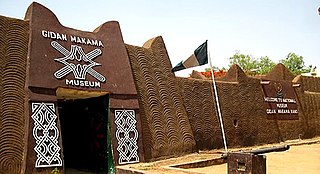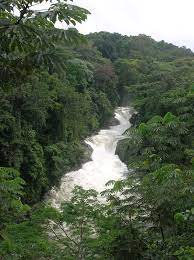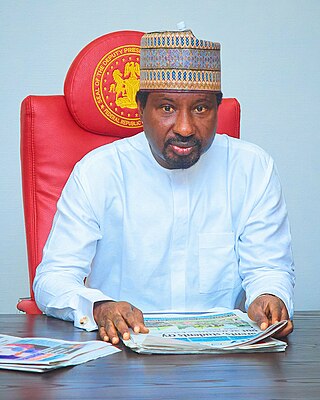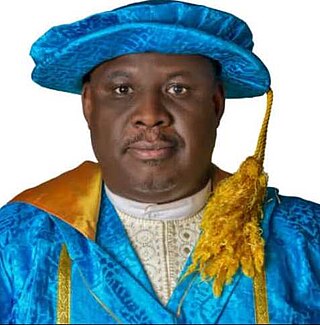
Kano is a city in northern Nigeria and the capital of Kano State. It is the second largest city in Nigeria after Lagos, with over ten million citizens living within 449 km2 (173 sq mi). Located in the Savanna, south of the Sahel, Kano is a major route of the trans-Saharan trade, having been a trade and human settlement for millennia. It is the traditional state of the Dabo dynasty who have ruled as emirs over the city-state since the 19th century. Kano Emirate Council is the current traditional institution inside the city boundaries of Kano, and under the authority of the Government of Kano State.

Northern Nigeria was an autonomous division within Nigeria, distinctly different from the southern part of the country, with independent customs, foreign relations and security structures. In 1962, it acquired the territory of the British Northern Cameroons, which voted to become a province within Northern Nigeria.

Yankari Game Reserve is a large wildlife park and former National Park located in the south-central part of Bauchi State, in northeastern Nigeria. It covers an area of about 2,244 km2 (866 sq mi) and is home to several natural warm water springs, as well as a wide variety of flora and fauna. Its location in the heartland of the West African savanna makes it a unique way for tourists to watch wildlife in its natural habitat. Yankari was created as a game reserve in 1956, but later designated Nigeria's biggest national park in 1991. It is the most popular destination for tourists in Nigeria and plays a crucial role in the development and promotion of tourism and ecotourism in Nigeria. It is also a popular eco-destination in West Africa.

The Hadejia-Nguru wetlands in Yobe State in northern Nigeria, which include Nguru Lake, are ecologically and economically important. They are threatened by reduced rainfall in recent years, a growing population and upstream dam construction.

The Bayero University Kano (BUK) is a university situated in Kano, Kano State, Nigeria. It was founded in 1975, when it was renamed from Bayero University College and upgraded from University College to University. It is the first university in Kano State, North-western Nigeria.

The Guinean forest-savanna , also known as the Guinean forest-savanna transition, is a distinctive ecological region located in West Africa. It stretches across several countries including Guinea, Sierra Leone, Liberia, Ivory Coast, Ghana, Togo, Benin, Nigeria, and Cameroon. This region is characterized by a unique blend of forested areas and savannas, creating a diverse and dynamic landscape.
Articles related to Nigeria include:
Kano State House of Assembly is the state legislature of Kano State, Nigeria. The Kano State House of Assembly is one of the arms of Kano State Government which comprises the Executives, Judiciary and the legislatives, House of Assembly are the legislatives of Kano State. The Chamber and the offices of the Members are located at Abdu Bako Secretariat in the state capital, Kano Municipal. The House of Assembly is currently under the Leadership of All Progressives Congress (APC). There have been nine different house of assemblies the very first one was inaugurated 2 October 1979 and the present one was inaugurated 7 June 2019. There are forty members of the State House of Assembly, that represent forty-four local government areas in Kano State.

The Tiga Dam is located in southern part of Kano State in the Northwest of Nigeria, constructed in 1971–1974. It is a major reservoir on the Kano River, the main tributary of the Hadejia River. The dam was built during the administration of Governor Audu Bako in an attempt to improve food security through irrigation projects.

Gidan Makama Museum Kano or Kano Museum is a museum in Kano, Nigeria. This building served as temporary palace of Sarakunan Hausa of Kano before the current palace Gidan Rumfa was constructed in the 15th century The museum has a significant collections of arts, crafts and items of historic interest related to the Kano area. Located in a 15th-century historical building, which is recognised as a National Monument by the Government of Nigeria. The museum is divided into 11 galleries, each with their own centre of focus. Galleries include the Zaure or the main entrance hall with displays of traditional materials, city walls and maps of Kano, the history of statehood, Kano in the 19th century, the Civil War, economy, industry and music.

Oba Hills Forest Reserve is a reserve in Iwo, Osun State, Nigeria, that covers about 52 square kilometres (20 sq mi) of hilly terrain with deep gorges. Oba Hill Forest Reserve is a small enclave encompassing three hills with a wide valley running in between. A large teak plantation is on its western side, covering about 12% of its total area. Beyond the hills; only coppices are left on the over-exploited plantation. According to a IUCN report from 2003, about 12% of the reserve had been planted with teak. Some chimpanzee sightings had been reported. In 1999, a dead chimpanzee was offered for sale in a local market. A 2009 report said that almost all of the reserve had been converted to plantations and farms, with only two gullies remaining forest-covered. It is now believed that chimpanzees are nearly extinct in the reserve.
Idanre Forest Reserve is in Idanre local government area of the Nigerian state of Ondo, in the south-west part of the country. This International Union for Conservation of Nature designated nature reserve covers 561 square kilometres (217 sq mi). It is a lowland rainforest with an altitude of 10 to 400 meters.
The Afi Mountain Wildlife Sanctuary in Cross River State in southern Nigeria covers 104 km2 (40 sq mi). The wildlife sanctuary was founded in 2000 to provide refuge for endangered animal species, including the Cross River gorilla, the Nigeria-Cameroon chimpanzee, the drill and the gray-necked rockfowl.
The Okomu Forest Reserve is a forest block covering an area of 1081 km2 in Edo State, about 50 km west of Benin City, Nigeria. The Okomu National Park lies within the larger reserve, maintaining a small part of the forests that once covered the region as the last habitat for many endangered species.
The Chad Basin National Park is a national park in northeastern Nigeria, in the Chad Basin, with a total area of about 2,258 km2. The park is fragmented, with three sectors. The Chingurmi-Duguma sector is in Borno State, in a Sudanian Savanna ecological zone. The Bade-Nguru Wetlands and Bulatura sectors are in Yobe State in the Sahel ecological zone.

The Kamuku National Park is a Nigerian national park in Kaduna State, Nigeria, with a total area of about 1,120 km2 (430 sq mi). The park has a typical Sudanian Savanna ecology.

The Sambisa Forest is a forest in Borno State, northeast Nigeria. It is in the southwestern part of Chad Basin National Park, about 60 km southeast of Maiduguri, the capital of Borno State. It has an area of 518 km2.

Barau I. Jibrin is a Nigerian politician who is the current deputy president of the Nigerian Senate since 2023. He is the senator representing Kano North since 2015.

Aliyu Salisu Barau is a Nigerian academic and a full professor of Urban and Regional Planning at Bayero University Kano. He is the Dean of the Faculty of Earth and Environmental Sciences at Bayero University Kano and the West Africa Hub Director of the Urban Climate Change Research Network (UCCRN), affiliated with the Earth Institute, Columbia University. He is also a Chartered Town Planner of the UK's Royal Town Planning Institute (RTPI).












